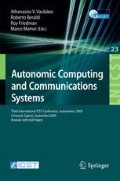Abstract
We describe some experiments which simulate a grounded approach to language acquisition in which a population of autonomous agents without prior linguistic knowledge tries to construct at the same time a conceptualisation of its environment and a shared language. The conceptualisation and language acquisition processes in each individual agent are based on general purpose cognitive capacities, such as categorisation, discrimination, evaluation and induction. The emergence of a shared language in the population results from a process of self-organisation of a particular type of linguistic interaction which takes place among the agents in the population.
The experiments, which extend previous work by addressing the problem of the acquisition of both the semantics and the syntax of propositional logic, show that at the end of the simulation runs the agents build different conceptualisations and different grammars. However, these conceptualisations and grammars are compatible enough to guarantee the unambiguous communication of propositional logic sentences.
Furthermore the categorisers of the perceptually grounded and logical categories built during the conceptualisation and language acquisition processes can be used for some forms of common sense reasoning, such as determining whether a sentence is a tautology, a contradiction, a common sense axiom or a merely satisfiable formula.
Access this chapter
Tax calculation will be finalised at checkout
Purchases are for personal use only
Preview
Unable to display preview. Download preview PDF.
References
Sierra, J.: Grounded models as a basis for intuitive and deductive reasoning: The acquisition of logical categories. In: Proceedings of the European Conference on Artificial Intelligence, pp. 93–97. IOS Press, Amsterdam (2002)
Sierra, J., Santibáñez, J.: The acquisition of linguistic competence for communicating propositional logic sentences. In: Artikis, A., O’Hare, G.M.P., Stathis, K., Vouros, G.A. (eds.) ESAW 2007. LNCS (LNAI), vol. 4995, pp. 175–192. Springer, Heidelberg (2008)
Steels, L.: The origins of syntax in visually grounded robotic agents. Artificial Intelligence 103(1-2), 133–156 (1998)
Batali, J.: The negotiation and acquisition of recursive grammars as a result of competition among exemplars. In: Linguistic Evolution through Language Acquisition, pp. 111–172. Cambridge University Press, Cambridge (2002)
Kirby, S.: Learning, bottlenecks and the evolution of recursive syntax. In: Linguistic Evolution through Language Acquisition: Formal and Computational Models, pp. 96–109. Cambridge University Press, Cambridge (2002)
Steels, L.: The Talking Heads Experiment. Special Pre-edition for LABORATORIUM. Antwerpen (1999)
Harnad, S.: The symbol grounding problem. Physica D (42), 335–346 (1990)
Wittgenstein, L.: Philosophical Investigations. Macmillan, New York (1953)
Vogt, P.: The emergence of compositional structures in perceptually grounded language games. Artificial Intelligence 167(1-2), 206–242 (2005)
Bueno, F., Cabeza, D., Carro, M., Hermenegildo, M., López-García, P., Puebla, G.: The Ciao Prolog system. reference manual. Technical Report CLIP3/97.1, School of Computer Science, Technical University of Madrid, UPM (1997), http://www.clip.dia.fi.upm.es/
McCarthy, J.: Formalizing Common Sense. Papers by John McCarthy. Edited by Vladimir Lifschitz. Ablex, Greenwich (1990)
Author information
Authors and Affiliations
Editor information
Editors and Affiliations
Rights and permissions
Copyright information
© 2010 ICST Institute for Computer Science, Social Informatics and Telecommunications Engineering
About this paper
Cite this paper
Sierra, J., Santibáñez, J. (2010). Experiments on the Acquisition of the Semantics and Grammatical Constructions Required for Communicating Propositional Logic Sentences. In: Vasilakos, A.V., Beraldi, R., Friedman, R., Mamei, M. (eds) Autonomic Computing and Communications Systems. AUTONOMICS 2009. Lecture Notes of the Institute for Computer Sciences, Social Informatics and Telecommunications Engineering, vol 23. Springer, Berlin, Heidelberg. https://doi.org/10.1007/978-3-642-11482-3_16
Download citation
DOI: https://doi.org/10.1007/978-3-642-11482-3_16
Publisher Name: Springer, Berlin, Heidelberg
Print ISBN: 978-3-642-11481-6
Online ISBN: 978-3-642-11482-3
eBook Packages: Computer ScienceComputer Science (R0)

